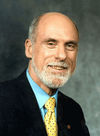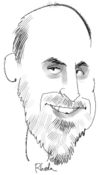Vinton Cerf: Difference between revisions
No edit summary |
No edit summary |
||
| Line 11: | Line 11: | ||
}} | }} | ||
'''Vinton G.''' ('''Vint''') '''Cerf''' is a computer scientist and widely recognized as one of the "Fathers of the Internet."" He was one of the inventors of the internet architecture and co-designer of the basic protocols ([[TCP/IP]]) along with [[Robert Kahn]]. He serves as vice president and chief internet evangelist for [[Google]] and his primary responsibility is to identify new enabling technologies to support the development of advanced internet-based products and services of the company.<ref>[http://www.mondostars.com/business/vintoncerf.html mondostars]</ref> <ref>[http://www.persona.rin.ru/eng/view/f/0/18040/vinton-cerf-vinton-cerf Persona]</ref> <ref>[http://www.livinginternet.com/i/ii_cerf.htm Living Internet]</ref> | '''Vinton G.''' ('''Vint''') '''Cerf''' is a computer scientist and widely recognized as one of the "Fathers of the Internet."" He was one of the inventors of the internet architecture and co-designer of the basic protocols ([[TCP/IP]]) along with [[Robert Kahn]]. He serves as vice president and chief internet evangelist for [[Google]] and his primary responsibility is to identify new enabling technologies to support the development of advanced internet-based products and services of the company.<ref>[http://www.mondostars.com/business/vintoncerf.html mondostars]</ref> <ref>[http://www.persona.rin.ru/eng/view/f/0/18040/vinton-cerf-vinton-cerf Persona]</ref> <ref>[http://www.livinginternet.com/i/ii_cerf.htm Living Internet]</ref> He currently involved in the Interplanetary Internet Project.<ref>[http://www.cnn.com/2011/12/22/tech/web/icann/ ICANN, CNN.com]</ref> | ||
His personal interests include fine wine, gourmet cooking and science fiction. Cerf and his wife, Sigrid, were married in 1966 and have two sons, David and Bennett. | His personal interests include fine wine, gourmet cooking and science fiction. Cerf and his wife, Sigrid, were married in 1966 and have two sons, David and Bennett. | ||
Revision as of 00:08, 7 April 2012
 |
 |
| Country: | USA |
Vinton G. (Vint) Cerf is a computer scientist and widely recognized as one of the "Fathers of the Internet."" He was one of the inventors of the internet architecture and co-designer of the basic protocols (TCP/IP) along with Robert Kahn. He serves as vice president and chief internet evangelist for Google and his primary responsibility is to identify new enabling technologies to support the development of advanced internet-based products and services of the company.[1] [2] [3] He currently involved in the Interplanetary Internet Project.[4]
His personal interests include fine wine, gourmet cooking and science fiction. Cerf and his wife, Sigrid, were married in 1966 and have two sons, David and Bennett.
Internet Organizations[edit | edit source]
Vinton Cerf serves as chairman of the board of ICANN. Cerf was seated at the 1999 annual meeting, having been selected by the Protocol Supporting Organization. He was selected by the nominating committee for a term on the Board of Directors, which ran from June 2003 through their 2004 meeting.
Cerf served as founding president of ISOC from 1992 to 1995, and in 1999 served a term as chairman of the board. In addition, Cerf is honorary chairman of the IPv6 Forum, dedicated to raising awareness and speeding introduction of the new Internet protocol. Cerf served as a member of the U.S. Presidential Information Technology Advisory Committee (PITAC) from 1997 to 2001 and serves on several national, state and industry committees focused on cyber-security.
Other Work[edit | edit source]
In addition to his work on behalf of MCI and the internet, Cerf has served as a technical advisor to production for "Gene Roddenberry's Earth: Final Conflict." [5]and made a special guest appearance on the program in May 1998. Cerf has appeared on television programs NextWave with Leonard Nimoy and on World Business Review with Alexander Haig and Caspar Weinberger. Cerf also holds an appointment as distinguished visiting scientist at the Jet Propulsion Laboratory where he is working on the design of an interplanetary Internet.
Cerf sits on the Board of Directors for the Endowment for Excellence in Education, Folger Shakespeare Library, the MCI Foundation, the MarcoPolo Foundation, Avanex Corporation and the ClearSight Systems Corporation. Cerf is a Fellow of the IEEE, ACM, and American Association for the Advancement of Science, the American Academy of Arts and Sciences, the International Engineering Consortium, the Computer History Museum and the National Academy of Engineering.
Internet Evangelism[edit | edit source]
In December, 2011, Vint Cerf signed onto an open letter to the U.S. Congress sent by the Electronic Frontier Foundation that urged the legislature not to pass SOPA bills, which he and the 82 other signees believed would seriously hinder the future of the Internet, U.S. legitimacy with regards to Internet stewardship, and many industries tied together through the Internet, among other deleterious effects.[6]
New gTLDs[edit | edit source]
In November, 2011, Vint Cerf noted that he was "nervous" of ICANN's planned gTLD expansion, which was to proceed in a matter of months. Some of his concerns included the confusion created for end users, potential problems for trademark owners, and possible logistical issues, especially with regards to any new gTLD operators going out of business. Mr. Cerf did added that it seemed too late for any outside intervention into the program, and that it would consequently be important to closely monitor the gTLD expansion process and fix any issues as they arise.[7]
Recognition and Awards[edit | edit source]
Vinton Cerf is a recipient of numerous awards and commendations in connection with his work on the Internet. These include the Marconi Fellowship, Charles Stark Draper award of the National Academy of Engineering, the Prince of Asturias award for science and technology, the National Medal of Science from Tunisia, the Alexander Graham Bell Award presented by the Alexander Graham Bell Association for the Deaf, the NEC Computer and Communications Prize, the Silver Medal of the International Telecommunications Union, the IEEE Alexander Graham Bell Medal [8], the IEEE Koji Kobayashi Award, the ACM Software and Systems Award, the ACM SIGCOMM Award, the Computer and Communications Industries Association Industry Legend Award, the Yuri Rubinsky Web Award, the Kilby Award , the Yankee Group/Interop/Network World Lifetime Achievement Award, the George R. Stibitz Award, the Werner Wolter Award, the Andrew Saks Engineering Award, the IEEE Third Millennium Medal, the Computerworld/Smithsonian Leadership Award, the J.D. Edwards Leadership Award for Collaboration, World Institute on Disability Annual award and the Library of Congress Bicentennial Living Legend medal.
In December 1997, President Clinton presented the U.S. National Medal of Technology to Cerf and his partner, Robert Kahn, for founding and developing the Internet. [9]. Kahn and Cerf were named the recipients of the ACM Alan M. Turing award in 2004 for their work on the Internet protocols. The Turing award is sometimes called the "Nobel Prize of Computer Science". [10]
In December, 1994, People magazine identified Cerf as one of that year's "25 Most Intriguing People."
Reaction[edit | edit source]
Dr. Cerf has been humble with regards to both sharing credit of the "invention" of the Internet, and aware of the large number of people who contributed to its development, both before and after himself. He has been quoted as saying that building a tool is one thing, but credit for what people do with that tool is something that no inventor can claim.[11]
Values[edit | edit source]
As one of the most widely respected and well-known Internet evangelists, Mr. Cerf takes vocal stands on a number of ICT and Internet Governance issues, including:
- Vint Cerf believes in the need for anybody to remain anonymous or pseudonymous on the Internet; he believes this needs to also be supported by strong authentication tools.
- Mr. Cerf has argued that unnecessary patents can stifle innovation, and noted that the Internet would not have experienced such rapid and robust development had he and his partners tried to protect its design.[12]
- In an Op-ed piece in the New York Times, found here, Vint declares that the Internet itself is not a human right, but notes that technology is an enabler of a broad range of other rights. He notes that tools and values change, but that human rights are indispensable and universal. He goes on to describe technology and Internet access as more akin to a civil right, but is clear that he believes it is not yet a civil right. He ends by noting that it is in the hands of those that empower technology, such as legislators and engineers, to ensure that the Internet can thrive as a tool to access and achieve one's civil and human rights.[13]
Education[edit | edit source]
Cerf holds a Bachelor of Science degree in Mathematics from Stanford University and Master of Science and Ph.D. degrees in Computer Science from UCLA. He also holds honorary Doctorate degrees from the Swiss Federal Institute of Technology (ETH), Zurich; Lulea University of Technology, Sweden; University of the Balearic Islands, Palma; Capitol College, Maryland; Gettysburg College, Pennsylvania; George Mason University, Virginia; Rovira i Virgili University, Tarragona, Spain; Rensselaer Polytechnic Institute, Troy, New York; the University of Twente, Enschede, The Netherlands; Brooklyn Polytechnic; and the Beijing University of Posts and Telecommunications.
Career History[edit | edit source]
Vinton Cerf joined Google in September, 2005. [14] In Google, he is responsible for identifying new enabling technologies to support the development of advanced, internet-based products and services. He is also an active public face for Google.
Cerf is the former senior vice president of Technology Strategy for MCI. [15] In this role, Cerf was responsible for helping to guide corporate strategy development from the technical perspective. Previously, Cerf served as MCI's senior vice president of architecture and technology, leading a team of architects and engineers to design advanced networking frameworks including internet-based solutions for delivering a combination of data, information, voice and video services for business and consumer use.
Prior to rejoining MCI in 1994, Cerf was vice president of the Corporation for National Research Initiatives (CNRI). As vice president of MCI Digital Information Services from 1982 to 1986 he led the engineering of MCI Mail, the first commercial email service to be connected to the Internet.
During his tenure, from 1976 to 1982, with the U.S. Department of Defense's Advanced Research Projects Agency (DARPA), Cerf played a key role leading the development of the internet, and internet related data packet and security technologies.
He has also worked in numerous other IT companies and corporations. [16]
References[edit | edit source]
- ↑ mondostars
- ↑ Persona
- ↑ Living Internet
- ↑ ICANN, CNN.com
- ↑ IMDB
- ↑ Internet Inventors Warn Against SOPA and PIPA, EFF.org
- ↑ Fomer ICANN Chair Voice Concern, TechDailyDose.NationalJournal.com
- ↑ IEEE
- ↑ THE WHITE HOUSE
- ↑ ACM.org
- ↑ NYTimes.com
- ↑ VentureBeat.com
- ↑ Internet Access is Not a Human Right
- ↑ ITU
- ↑ ICANN
